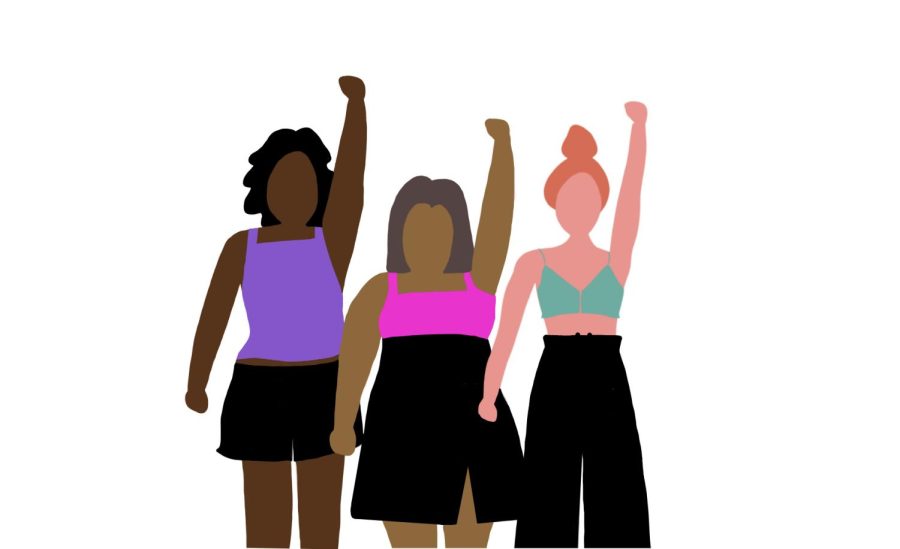Creating a Body Positivity Movement That Is Actually Positive Starts With Eliminating Fatphobia
February 9, 2022
This article discusses eating disorders and disordered eating habits.
What has turned into a body-positivity movement fighting for better treatment of each and every kind of body originally started as the “Fat Rights Movement” in 1969 by a man named Bill Fabrey. In New York, Fabrey passed printed copies of an article about the mistreatment of fat people on behalf of his wife, a fat woman, who was facing societal mistreatment due to her weight.
In some ways, we have come a long way towards creating a world that is truly body-positive, but we still have a long way to go.
The body positivity movement began as a vow to speak out against fatphobia, and now more than 50 years later, fatphobia is an issue that society continues to face.
The National Association to Advance Fat Acceptance (NAAFA) is the longest-running organization for body positivity, and they are still active today. Understanding the true meaning of body positivity starts with dissecting the name of this activist group. Notice how the goal is to advance fat acceptance, not to advance fat promotion.
There are so many misconceptions about why being fat-positive is bad, almost all of which center around the idea that being overweight equates to being unhealthy.
While this might sometimes be true, it is not the job of TikTok commenters to point out when someone’s weight has reached a point of danger. People should be able to exist online without strangers taking it as their duty to deem them unhealthy.
A lot of people who are overweight have no desire to change that, and they do not owe it to you or anybody else to do so.
As an 18-year-old woman, I have finally reached a point in my life where I feel comfortable in my own skin, but I did not reach this level of self-acceptance because I “finally got skinny.”
I grew up as a kid who was always overweight, and this experience is not one that I would wish on my worst enemy.
Since I first started going online when I was 10 or 11 years old, I’ve noticed that achieving body confidence is almost always associated with being skinnier. I’ve only spent about nine months of my five-plus years as a teenager being in the “healthy weight” category, and in my experience, this is when I felt the most dissatisfied with the way I looked.
Although I am now able to live my day-to-day life less caught up on how my body looks to others, this is something that I have worked towards my entire life.
Even when I was in elementary school, I received tormenting comments from my classmates about my weight, and as I grew up and moved onto middle school these comments only became crueler.
When I was in sixth grade, I made it my mission to finally achieve my lifelong dream of being skinny. I didn’t care about “getting fit” or “starting to take better care of myself” — I just wanted to fit in.
I began restricting my food intake heavily, and in turn, I began to lose weight. I received validation from my peers following my rapid weight loss, and to my surprise, I felt worse than ever.
The compliments I received from people did nothing for me because I hadn’t actually achieved or accomplished anything. I was beginning to fit the standard I had always wanted to fit, but that is not where true self-acceptance comes from. I still felt ashamed.
This caused me to begin using food as a coping mechanism for my damaged self-esteem. This habit snowballed into a Binge Eating Disorder, or BED, which is one of the least talked about — but most common — forms of an eating disorder.
BED is the most common eating disorder among Americans but is oftentimes neglected by medical professionals, therefore leaving those suffering from the disorder unable to receive proper treatment for it.
The disorder was not even recognized as a legitimate mental illness until 2013 so the amount of research on warning signs and how best to treat it is limited, and it has been found that lots of people diagnosed with BED are completely unaware of the disorder’s existence until they are diagnosed with it.
All of these factors play into the major lack of help available to people suffering from BED, and they point at a larger societal issue regarding fatphobia in all forms.
My own experience with BED has been extremely eye-opening, as it has allowed me to see just how horribly the world treats fat people.
When I was skipping meals and denying my body food, I was applauded and told how good I looked. When I began binging, I was seen as a person without self-control, and I was given condolence-driven, backhanded compliments following my resulting weight gain.
Assumptions are often made that overweight people have binging tendencies and that underweight people don’t eat enough.
These judgments are entirely invalid, as they connect having Anorexia or Bulimia with being skinny, and connect having BED to being fat. This is not the reality. Many overweight people struggle with Anorexia and Bulimia, and many underweight people struggle with BED.
Weight and size are not always associated with someone’s diet and exercise regime, and reminding people of this clarification is necessary for reducing judgment surrounding other people’s bodies.
Improving the care and treatment for BED patients — and eating disorder patients in general — should be at the forefront of the body positivity movement, as should be prioritizing the health of all, for the sake of being healthy, not in order to look a certain way or appeal to a certain beauty standard.
In addition to the mistreatment I received from my peers, I grew up watching Disney Channel and Nickelodeon TV shows that almost never featured a weight-diverse cast. When a non-skinny character was featured, they were almost always there to be part of a plotline in which a fat character was pitied by the main characters.
Change in the area of media portrayals is needed in almost all areas of diversity. When will fat main characters, non-white main characters, gay main characters, etc. be able to exist without the discrimination they face being the most focused on part of their plot?
The commercials between these episodes would then advertise diet-food companies including, but not limited to, Slimfast, Nutrisystem, and Weight Watchers. Truly, the list could go on forever.
You could not and still cannot consume media without being reminded of the overwhelming societal pressure to be skinny.
The freedoms people currently have online through social media eliminate the possibility to rid popular media completely of fatphobic content, but diversifying mainstream media like movies and TV shows is a step in the right direction.
Social media is another extremely impactful — and arguably the most impactful — contributing factor to how broken the body positivity movement is. As a part of mass media as a whole, social media sites have opened a new realm of possibilities to both help but also hurt this movement. Often, it ends up being the latter.
The first social media site to be plagued with fatphobia to extreme levels was Tumblr. The site’s platform served as a home for the glamourization of Anorexia and Bulimia, which has since relocated to other social media sites — particularly Twitter and TikTok.
Other vocabulary used to promote these dangerous and fatphobic ideas include words like “thinspo,” and “fatspo.”
These words combine “thin” with “inspiration,” and “fat” with “inspiration,” and are used to describe pictures of both thin people and fat people, to fuel your desire to be skinny in two different ways.
Traditionally, thinspo pictures are used to show a body that is admirable and idealistic, while fatspo pictures are used to show a body that you should stay away from, even at the expense of your own health.
There was a time when it seemed that the days of extreme fatphobia on social media were numbered, as Tumblr became less and less popular. However, this destructive trend only relocated and replanted itself on TikTok.
As the coronavirus began, I started to see a rise in harmful videos about diet and exercise, which have only taken over more of the app over time. So many of the trends on TikTok feature body-checking of some kind, and no matter what the person in the video looks like, the comments are almost always vile.
When someone who is overweight posts a video on TikTok wearing a bathing suit, a tight dress, or revealing clothing of any kind, you will likely see comments along the lines of “I wish I had your confidence” or “I’m so glad I found someone on this app with a realistic body.”
Although these comments might seem uplifting, they are objectifying and are praising someone for simply existing as a fat person.
These TikTok accounts aren’t choosing to post a video of them at the pool to be an inspiration for fat people everywhere, they are just trying to live and participate in trends like every other teenager using the platform.
In my eyes, the body positivity movement, in a perfect world, would mean a mutual desire to eliminate fatphobia in workplaces, social settings, and throughout the world. It would also mean working towards a reality where all people are able to feel comfortable in their bodies every day, not just on days where they feel that their body appeals to the expectation society has set for them.
For years I have taken criticism for my body, and not once have I been able to understand why people are so bothered by my existence, just because of my weight. The feeling that people are pitying you just for the way you look, especially as a child, is both developmentally damaging, and esteem-crushing.
No matter what somebody weighs, they will remain the same person they always have been. A person’s identity is not determined by their size, big or small, and feeling bad for somebody because of their weight is not doing them any good.
They do not need your pity, and they do not want it.
I do not need your pity, and I do not want it.







Brooklyn C • Feb 10, 2022 at 2:42 pm
!! thank you so much for writing this piece, avery! <33
Maia Gutmann • Feb 10, 2022 at 8:51 am
This is extremely well-written and such an important topic to bring light to. Thank you for writing this.
Julia • Feb 9, 2022 at 9:06 pm
This is such a powerful piece. Thank you for writing about this.